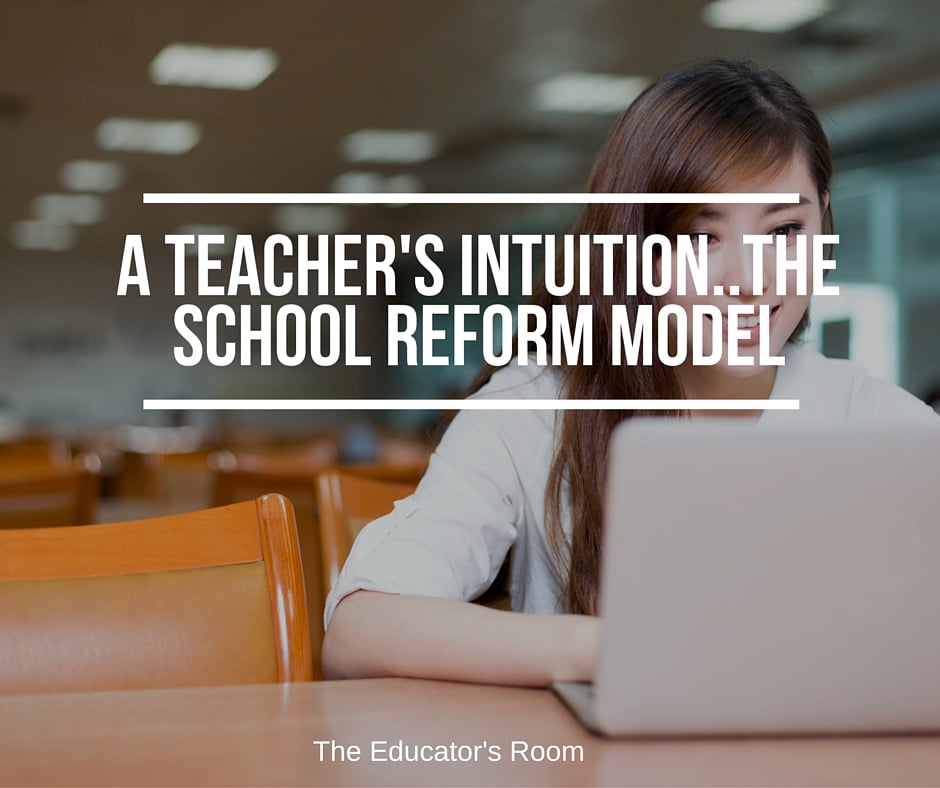Education reform needs to include a renewed respect for the teaching profession, along with respect for the knowledge and intuition that teachers bring to the classroom. It may be uncomfortable for the drivers of the current reform narrative to admit, but it needs to be discussed because many of the “choices” pushed to the forefront have started with removing experience, quality, and profession from the delivery systems. In their place, less expensive and supposedly more efficient “choices” and curriculum (e.g., no-excuses, authoritarian models, scripted and/or “individualized”, web-based instruction…) are suggested as substitutes.
It isn’t that these options and more shouldn’t be utilized when needed. The reality is that more flexible delivery models need to be available because of a more flexible and dynamic world economy. In addition, there are struggling populations that have gone chronically under-served in traditional schools. But when these options are presented as treatments for a symptom (students not meeting academic standards), and standardized tests are presented as the most important tool for evaluating effectiveness and helping students meet standards, the need to diagnose and then treat the disease (systemic economic inequity with underlying social and moral decay) is ignored. Maybe this sort of discussion is avoided, though, precisely because it would lead to more of that “symptom-vs-disease” debate reformers shy away from. Or maybe it’s avoided because money (more than profession, pedagogy, and even children) was the main “reform” concern from day one. It is simply antithetical to leaders of a society built on consumption and collection of other people’s work and resources to consider more equitable and sustainable models. A concept other than “train them to work efficiently and obediently” is counter-intuitive for them.
But there has been some educated and informed backlash to the “train them for efficiency and obedience” premise. Intuition isn’t limited to the teaching profession, it can exist in any who care about others and the world around them, and “wrong” becomes pretty easy to identify especially for parents who want to leave a better world for children.
So now, here in New York, faced with undeniable political pressure, our governor and leaders in education have been citing a faulty roll-out of the new common core standards as the source of discord and discontent within the state. Despite the “whoopsie” defense, though, it was clear in 2010 with New York’s committal to common core standards , and the Obama administration’s Race to Traumatize Teachers (RTTT) competition, that there was money to be made in a system simplified and depersonalized to a well-guarded test and punish one (as opposed to give support where support is needed one). A system where funding privately operated and under-mandated charters was encouraged and promoted while putting the accountability screws to already overwhelmed traditional screws was portrayed as the new “Desert Storm”-hunting down failing schools and bad teachers and holding them accountable. Driving this Hunger Games-style competition for funding scraps was the Regents Reform Agenda, helping to shock-and-awe public education into a scared and compliant survival mode while denying the concerns of the profession regarding resources, programming cuts, child/learner development realities, inconsistency with evaluations in non-tested subjects…
But back to the “agenda”.
As Big Dan Teague would say: “It’s all about the money, boys!” If you haven’t seen O Brother Where Art Thou , I recommend it highly. A fun movie loosely based on Homer’s The Odyssey , the part where Big Dan lures the unsuspecting adventurers to a comfortable place under the guise of collaborating and giving them helpful advice is the part that applies here. Once Dan has fed himself full on the food provided to him, he breaks a huge branch off a tree, beats the two unconscious and robs them of what money they have. Oh, and for good measure, he mercilessly squashes a toad they’ve been carrying in a box. The less intelligent of the two travelers believes the toad to be a friend who was “loved up and turned into a horny toad.”
I’ll now return from artistic license mode and back to some facts:
Consider the description of this agenda and the regents from Stephen Cohen
The agenda, in part:
Looking to get $700 million from the federal government’s Race-to-the-Top initiative (a one-time payment of about 3% of total annual state spending on education, half of which was earmarked to create a data system), the Regents agreed to tie every local school district’s curriculum to national learning standards, known as Common Core Standards.
(Okay, I apologize. “RTTT” is Race to the Top, not Race to Traumatize Teachers)
The NYSED Regents:
“…a non-elected body of 17 citizens who control all education policy in the state and oversee the State Education Department, whose leader is the commissioner of education, [fusion_builder_container hundred_percent=”yes” overflow=”visible”][fusion_builder_row][fusion_builder_column type=”1_1″ background_position=”left top” background_color=”” border_size=”” border_color=”” border_style=”solid” spacing=”yes” background_image=”” background_repeat=”no-repeat” padding=”” margin_top=”0px” margin_bottom=”0px” class=”” id=”” animation_type=”” animation_speed=”0.3″ animation_direction=”left” hide_on_mobile=”no” center_content=”no” min_height=”none”][formerly] Dr. John King Jr.”
To begin with, New York’s Governor Cuomo (who disavows any involvement in education policy when citizen discontent leads to political liability) and the state’s education department (which has recently “failed upward” two of the worst roller-outters: the aforementioned John King and former Deputy Commissioner Ken Wagner) shoved our children into the deep end of the common core pool. Not that some common and rigorous standards aren’t a good idea, but with little input from those closest to the “front lines” and more familiar with learner development and pedagogy-that faulty roll-out seemed as if it were by design. I guess it could be that the governor (a centrist-right Democrat always proud of his ability to work both sides of the aisle) was willing to sell out more socially progressive reform efforts to private interests who had eyes on the urban education market and money in the governor’s campaign war chest. It certainly would be a way to earn support from your most likely urban voters anxious to free their babies from less likely to vote cohorts in dangerous and disruptive urban schools. It also might be that well over half a million unionized teachers across the state can be outspent three times over by a short list of donors interested in privatizing public education and creating schools that would siphon away more capable and supported students-along with whatever public money might come with them.
Regardless of the motives, this situation was foretold in my tiny rural district years ago. A former superintendent even warned us…it was almost like a strange prediction of things to come, and he said, “This is not about you, this is about urban schools and the state trying to do something about them…but it’s coming here, and it is not good for kids.”
He was right then, and he would be right now. This is not about what is necessarily good for kids, this is about economics and survival. It’s about the cheapest and most efficient solution to an economic and social situation that our leaders do not want to fix because their power and privilege is maintained by not fixing it. It is also about trying to help more kids that would fall off the edge to survive-so how do you entirely oppose it? Why would you?
[bctt tweet=”Life and education should be about more than mere survival in a system meant to benefit someone else.” username=”EducatorsRoom”]
Well, for one thing, life and education should be about more than mere survival in a system meant to benefit someone else. It should be about doing the right thing, honoring and feeding and growing every learner’s gift and desire to find their own path. It should be as much about trivial as it is about survival (and again, I really will someday put together a glossary), and to really, really be good at that requires intuition. Reform built on accountability hinged on absolutely inane tests and lock-down, non-disclosure, career ending top-level clearance secrecy threats to protect them: it’s no wonder that many struggling districts fell prey to “teaching to the tests”, and it’s no wonder that the gifts dedicated educators bring have been forced to take a back seat far too often. Some schools in poorer districts, desperate for a practical and financially feasible solution to the needs for new curriculum, chose to go with the curriculum modules made available for free on the state’s engageny website. I may get more into those in the future, but for now, I’ll just say that those modules were not then and are not now a turnkey solution to your curriculum needs. Like anything that happens in a classroom, they are best served when prepared and presented by experienced educators, as evidenced by the grant money freed up and the call put out in N.Y., in April of 2014, for educators to help revise them:
“This proposed grant aims to secure, through release time from their school district, BOCES, or charter school employee, the additional participation of highly qualified NYS educators in the process of revising and enhancing currently available curricular materials posted on EngageNY.org, resulting in a new version of materials for use in the current 2015- 2016 school year.”
While the offerings on EngageNY have expanded, and many corrections have been made, such resources should never serve to replace the seasoned, intuitive teacher’s gift to spot opportunities, teachable moments, and places where a “tweak” can make something work better on a particular day, at a particular moment, or for a particular student. When it happens and it works, it can breathe life into a class and hope back into a teacher. For me, when I even hear about it, I am inspired for that teacher and the students. That’s intuition: when you feel something is right, go with it, and discover that it was truly right. It can’t be scripted or served up cheap with some impersonal data point as your goal.
So now, two very brief stories. The characters will be called Teacher One and Teacher Two.
Teacher One came to me recently. Seems she just had to tell me about something she had done, and she was nervous at first. She hadn’t followed the script and done exactly as the module lesson instructed, and thought that possibly it could lead to trouble…but she was excited and had to tell me. The lesson had called for the teacher to give words to students to categorize into levels, 1-2-3, according to how challenging and vivid they were. Student engagement seemed to be weak, so she altered the lesson. Instead, she had a discussion about what might make words vivid and challenging and then turned it into them finding and justifying their selections and categorization themselves. These third graders went above and beyond, even choosing hyphenated word-phrases-backing up that selection with an explanation of how that hyphenation enhanced/altered the meaning of the vocabulary. This teacher was practically beaming, and I was thrilled to see it. She has been teaching for as long as I have, has served in a variety of aspects, and we have been witness to the insanity of canned curriculum, and victims of a state willing to deny inclusion of professionals with gifts to bring to the table. This teacher used the gift of intuition and used it well.
Teacher Two and I were talking following the last day of state testing. She was slightly worried that on a beautiful sunny Friday, following a rigorous gauntlet of testing days where little children are forced to be silent for unlimited time, near the end of the day, right before a week off from school…she was afraid that taking them outside for the last half hour was not being a responsible teacher. (Reformers, privatizers, I blame this on you, but I am not worried because I can fix it) . First, I asked her if she really was worried that after all those things, she was somehow slacking off on her job, she said that yes, she was. This is how the rest of that conversation went:
Me: Do you own a car?
Teacher Two: Yes.
Me: Do you drive it?
She: Yes.
Me: Do you think that it’s your job if you want your car to work right and get you where you want to go, to change the oil every once in a while?
She said that she really liked that analogy.
I do too. It’s her first year, but I feel that she has intuition, and the poisoned water of education reform should not be allowed to kill it, or any of the other gifts that professional, dedicated, career educators bring to the endeavor.

[/fusion_builder_column][/fusion_builder_row][/fusion_builder_container]






